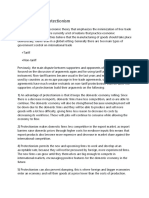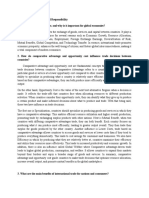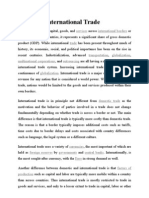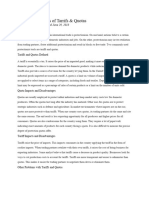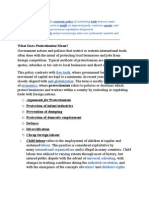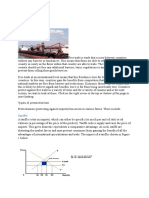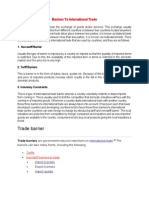Economics by Olekanma Doris: 1. Different Types of Barriers The Government May Use To Restrict Trade Answer
Economics by Olekanma Doris: 1. Different Types of Barriers The Government May Use To Restrict Trade Answer
Uploaded by
ADRIZOriginal Description:
Original Title
Copyright
Available Formats
Share this document
Did you find this document useful?
Is this content inappropriate?
Report this DocumentCopyright:
Available Formats
Economics by Olekanma Doris: 1. Different Types of Barriers The Government May Use To Restrict Trade Answer
Economics by Olekanma Doris: 1. Different Types of Barriers The Government May Use To Restrict Trade Answer
Uploaded by
ADRIZCopyright:
Available Formats
ECONOMICS By Olekanma Doris
Different types of barriers the government may use to restrict trade Answer A tariff is either (1) a tax on imports or exports (an international trade tariff), or (2) a list of prices for such things as rail service, bus routes, and electrical usage (electrical tariff, etc.).[1] The meaning in (1) is now the more common meaning. The meaning in (2) is historically earlier. The meaning in (1) developed from a tabular list of tax rates for different import goods. Non-tariff barriers to trade (NTBs) are trade barriers that restrict imports but are not in the usual form of a tariff. Some common examples of NTB's are anti-dumping measures and countervailing duties, which, although called non-tariff barriers, have the effect of tariffs once they are enacted. Nontariff barriers to trade include import quotas, special licenses, unreasonable standards for the quality of goods, bureaucratic delays at customs, export restrictions, limiting the activities of state trading, export subsidies, countervailing duties, technical barriers to trade, sanitary and phyto-sanitary measures, rules of origin, etc. Sometimes in this list they include macroeconomic measures affecting trade. Import license is a document issued by a national government authorizing the importation of certain goods into its territory. Import licenses are considered to be non-tariff barriers to trade when used as a way to discriminate against another country's goods in order to protect a domestic industry from foreign competition. Import quota is a limit on the quantity of a good that can be produced abroad and sold domestically.[1] It is a type of protectionist trade restriction that sets a physical limit on the quantity of a good that can be imported into a country in a given period of time. If a quota is put on a good, less of it is imported. [2] Quotas, like other trade restrictions, are used to benefit the producers of a good in a domestic economy at the expense of all consumers of the good in that economy. A trade restriction is an artificial restriction on the trade of goods and/or services between two countries. It is the result of protectionism. However, the term is controversial because what one part may see as a trade restriction another may see as a way to protect consumers from inferior, harmful or dangerous products An embargo (from the Spanish embargo) is the partial or complete prohibition of commerce and trade with a particular country. Embargoes are considered strong diplomatic measures imposed in an effort, by the imposing country, to elicit a given national-interest result from the country on which it is imposed. Embargoes are similar to economic sanctions and are generally considered legal barriers to trade, not to be confused with blockades, which are often considered to be acts of war.[1] 2. The reason why government may impose trade barriers Answer To protect domestic jobs from cheap labor abroad. However, generally wages in industrialized countries are higher because their output per worker is higher. The high wages reflect higher productivity otherwise there is no comparative advantage and the owners should reduce wages to match productivity. To improve a trade deficit. A trade barrier make imports more expensive and decreases demand for imports. However, trade partners can do the same and increase prices for exports. This policy also doesnt necessarily fix the problem, if domestically produced goods arent competitive or might not be of good quality. Countries will also spend less on imports if their exports go down. To protect infant industries. Countries want to give newly developing industries time to grow and become competitive. However, in some cases the government protection never ends and these industries become competitive only because they have been given the benefit of the trade barrier. Protection from dumping. This is when imports are sold at below average cost. It is generally hard to prove and sometimes countries impose anti-dumping duties just to buy 1.
more time. 3. To provide more revenue- Governments gain extra revenue from tariffs (taxes on imports). The potential impact of trade barriers on consumers, employees and the economies of different countries Answer They decrease the amount of acceptable substitutes, and therefore support higher prices to consumers. Workers in manufacturing are motivated to seek trade barriers because they will negotiate wage increases from their employers when their employers show extra profitability from the protected market. Manufacturers are incentivized to seek more profit, and if they have to pay too much to workers either directly or in benefits, they will get their manufacturing done somewhere they can get cheaper workers that can still get the job done. And that is a source of both political populism and more protectionist sentiment from manufacturing workers. Increased Cost to Consumers Perhaps one of the most important disadvantages of trade restrictions is that it drives up the price of goods in a country where trade barriers artificially raise the price of imported products. The apparent effect of trade barriers is to prevent jobs from being lost to foreign competition, which is an argument used by many special interest groups to justify various types of trade barriers. In the long run, however, trade barriers force consumers to pay higher prices, since products that could otherwise be made cheaply overseas take more resources to produce domestically. Increased Costs to Domestic Suppliers Price hikes due to trade barriers don't just affect consumers. It also puts a strain on firms which supply raw goods and commodities to domestic industries. Without trade barriers in place, such firms can rely on the law of comparative advantage, meaning that it would cost them more to try to find a certain raw material in their own country than it would to buy from a country rich in a particular commodity. Trade barriers artificially raise prices on foreign commodities, making it less profitable to buy from other countries.
Less Competition- the fact that trade restrictions make it more costly to purchase goods from abroad results in the domestic industry facing less competition from foreign markets. In the short term, this can save jobs in select domestic industries. However, in the long run, it leads to customers having fewer choices in the products they buy. It also gives producers less incentive to create high-quality products available to the public. 4. Arguments against the use of trade barriers Answer Trade barriers despite their inept ability to aid the domestic and infant industries, it has been argued that in spite of this, the drastic use of trade barriers sometimes prove because of controversies between trading countries, thus leading to the invention of trade barriers to prevent and restrict the trade. Economists prove that most times this trade barriers most time brings about trade wars. Apart from that it also brings about an increase in prices of goods and services traded, thus leading to cases such as inefficiency iin the economy. Also, it makes consumers suffer by paying higher for the prices of traded goods. They decrease the amount of acceptable substitutes, and therefore support higher prices to consumers. Workers in manufacturing are motivated to seek trade barriers because they will negotiate wage increases from their employers when their employers show extra profitability from the protected market. Manufacturers are incentivized to seek more profit, and if they have to pay too much to workers either directly or in benefits, they will get their manufacturing done somewhere they can get cheaper workers that can still get the job done. And that is a source of both political populism and more protectionist sentiment from manufacturing workers.
You might also like
- Chess - Garry Kasparov - The Test of TimeDocument249 pagesChess - Garry Kasparov - The Test of TimeADRIZ93% (15)
- Parkinmacro15 1300Document17 pagesParkinmacro15 1300Avijit Pratap RoyNo ratings yet
- Trade RestrictionsDocument23 pagesTrade RestrictionsNamita patilNo ratings yet
- Trade RestrictionsDocument21 pagesTrade RestrictionsVaibhavi BorhadeNo ratings yet
- 5-Ristrictions in International Trade-1Document4 pages5-Ristrictions in International Trade-1Henry dragoNo ratings yet
- International TradeDocument2 pagesInternational TradeDhivya RamachandranNo ratings yet
- Team 3 ProjectDocument14 pagesTeam 3 ProjectGabriela LorenaNo ratings yet
- Free Trade Vs Protective TradeDocument5 pagesFree Trade Vs Protective TradePretom DasNo ratings yet
- Trade Restrictions in RussiaDocument15 pagesTrade Restrictions in Russiasayalipatil1196No ratings yet
- TariffDocument5 pagesTariffIrina MiQuiNo ratings yet
- Protectionsim Vs Free TradeDocument9 pagesProtectionsim Vs Free TradeRochris A. SanchezNo ratings yet
- The Theory of Tariffs and QuotasDocument68 pagesThe Theory of Tariffs and QuotasAda Teaches100% (1)
- Motives For Protectionism and Motives For TradeDocument4 pagesMotives For Protectionism and Motives For Tradecharlotte frances bagaoisanNo ratings yet
- Study Guide - Chapter 7 With Group TaskDocument9 pagesStudy Guide - Chapter 7 With Group Tasksarah.schaller27.04No ratings yet
- Internationl TradeDocument12 pagesInternationl TradeIneshkaNo ratings yet
- The Basics of Tariffs and Trade BarriersDocument6 pagesThe Basics of Tariffs and Trade BarriersRohit KumarNo ratings yet
- ASHIKADocument10 pagesASHIKAjay prakashNo ratings yet
- 27 - International TradeDocument5 pages27 - International Tradehoangduylong.iccNo ratings yet
- Tariff and Non-Tariff BarriersDocument41 pagesTariff and Non-Tariff Barriersjagdish91100% (1)
- Bài-tập-KTQT (GROUP 7) .Document6 pagesBài-tập-KTQT (GROUP 7) .bach15052003No ratings yet
- Advantages and Disadvantage of ProtectionismDocument3 pagesAdvantages and Disadvantage of ProtectionismMai Anh NguyễnNo ratings yet
- BBM 442 AssignmentDocument10 pagesBBM 442 AssignmentHashi MohamedNo ratings yet
- BBM 442 AssignmentDocument11 pagesBBM 442 AssignmentHashi MohamedNo ratings yet
- Business ManagementDocument6 pagesBusiness ManagementBechaida, Princess Aila A.No ratings yet
- CW 23 - 12 - 2023Document2 pagesCW 23 - 12 - 2023Ibrahim AbidNo ratings yet
- What Are The Arguments Given in Favour of Trade LiberalizationDocument4 pagesWhat Are The Arguments Given in Favour of Trade Liberalizationnouela18No ratings yet
- Explain Barriers To TradeDocument4 pagesExplain Barriers To TraderemmyisureNo ratings yet
- Sle Group 4 244 - 250Document6 pagesSle Group 4 244 - 250Saniya JainNo ratings yet
- Trade Barriers, Dumping Anti DumpingDocument30 pagesTrade Barriers, Dumping Anti Dumpingqwertyuiop_6421100% (3)
- Tariff and Non Tariff BarriersDocument9 pagesTariff and Non Tariff Barrierscharlotte frances bagaoisanNo ratings yet
- I Econo...Document12 pagesI Econo...Pawan SharmaNo ratings yet
- Tariff & Non-Tariff BarriersDocument29 pagesTariff & Non-Tariff BarriersSanjivSIngh0% (1)
- Economics NotesDocument27 pagesEconomics Notes570 BAF Drashti ShahNo ratings yet
- Free Trade Policy: Free Trade Occurs When There Are No Artificial Barriers Put in Place by Governments To RestrictDocument3 pagesFree Trade Policy: Free Trade Occurs When There Are No Artificial Barriers Put in Place by Governments To Restrictpaban2009No ratings yet
- What Is Protectionism?Document7 pagesWhat Is Protectionism?jannerickNo ratings yet
- Tariff and Non-Tariff BarriersDocument20 pagesTariff and Non-Tariff BarriersIsha Aggarwal100% (2)
- International 3Document5 pagesInternational 3marienNo ratings yet
- What Does Protectionism Mean?: Free Trade Anti-Globalization EconomicsDocument4 pagesWhat Does Protectionism Mean?: Free Trade Anti-Globalization Economicsravikantthakur2009No ratings yet
- Free Trade: Start LookingDocument6 pagesFree Trade: Start LookingDarshika Singh - KumarNo ratings yet
- What Are Tariffs and Non TariffsDocument4 pagesWhat Are Tariffs and Non TariffsRonalie SustuedoNo ratings yet
- Features of Free Trade: Free Trade Is A Policy by Which A Government Does Not Discriminate Against Imports or InterfereDocument6 pagesFeatures of Free Trade: Free Trade Is A Policy by Which A Government Does Not Discriminate Against Imports or Interfereatul_rockstarNo ratings yet
- EconomicsDocument7 pagesEconomicsdawoodsalafi7866No ratings yet
- Trade Barriers 1Document35 pagesTrade Barriers 1Mahesh DesaiNo ratings yet
- Benefits of International TradeDocument18 pagesBenefits of International TradeEnjier CilverNo ratings yet
- Trade Protection: Reasons, Types, Advantages and DisadvantagesDocument11 pagesTrade Protection: Reasons, Types, Advantages and Disadvantagesankit kumarNo ratings yet
- Parkinecon07 1300Document14 pagesParkinecon07 1300Dina SamirNo ratings yet
- What Is A Trade BarrierDocument6 pagesWhat Is A Trade BarrierShah AzeemNo ratings yet
- Advantages of Free TradeDocument8 pagesAdvantages of Free TradeRittika_Kat_Go_5148No ratings yet
- Barriers To International TradebaDocument6 pagesBarriers To International TradebafhinojosacNo ratings yet
- Quota Impacts and DisadvantagesDocument2 pagesQuota Impacts and DisadvantagesDarshika Singh - KumarNo ratings yet
- A Level Economics ProtectionismDocument8 pagesA Level Economics Protectionismchinsw1996No ratings yet
- 32.contradictions of Free TradeDocument25 pages32.contradictions of Free Traderamkumar100% (1)
- Interntionl Businessunit 3Document6 pagesInterntionl Businessunit 3Tharun VelammalNo ratings yet
- Instruments of Trade ControlDocument3 pagesInstruments of Trade ControlBHARAT REDDY VAKANo ratings yet
- Governmental Influence On International TradeDocument7 pagesGovernmental Influence On International Tradeabubakar100% (1)
- The Rise of Protectionism and Its Perils On The Domestic Politics and International RelationsDocument5 pagesThe Rise of Protectionism and Its Perils On The Domestic Politics and International RelationsTreblif AdarojemNo ratings yet
- Barriers To International TradeDocument3 pagesBarriers To International TradeKanika KapoorNo ratings yet
- Macroeconomics AssignmentDocument13 pagesMacroeconomics AssignmentAlly SallimNo ratings yet
- International Trade Assignment LijmuketDocument15 pagesInternational Trade Assignment LijmuketMuket AwokeNo ratings yet
- Comic Relief in Midsummer Night'sDocument2 pagesComic Relief in Midsummer Night'sADRIZNo ratings yet
- Name: Olekanma Doris: An Interesting PersonDocument3 pagesName: Olekanma Doris: An Interesting PersonADRIZNo ratings yet
- Trapped Have You Ever Felt Like Something Was Off When Everything Seemed So Right Well Here'S A Story To Tickle, That Is My StoryDocument1 pageTrapped Have You Ever Felt Like Something Was Off When Everything Seemed So Right Well Here'S A Story To Tickle, That Is My StoryADRIZNo ratings yet
- For. The Internet, A Blessing or A Curse For The Millenial Generation?Document3 pagesFor. The Internet, A Blessing or A Curse For The Millenial Generation?ADRIZNo ratings yet
- (Against) The Internet, A Blessing or A Curse For The Millenial Generation?Document4 pages(Against) The Internet, A Blessing or A Curse For The Millenial Generation?ADRIZNo ratings yet
- 0620 s07 Ms 1Document2 pages0620 s07 Ms 1Varun PanickerNo ratings yet
- The Internet, A Blessing or A Curse For The Millenial Generation?Document4 pagesThe Internet, A Blessing or A Curse For The Millenial Generation?ADRIZNo ratings yet





















